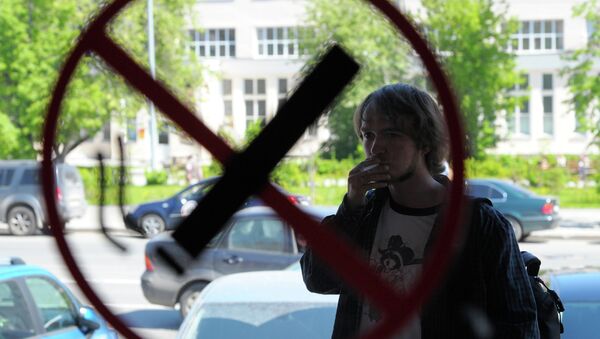MOSCOW, June 1 (RIA Novosti), Nikita Alentyev – Russia’s ban on smoking in an extended number of public areas, including bars and restaurants takes effect June 1, but is hardly the core reason why the consumption of tobacco is dropping, Alexander Lioutyi of British American Tobacco (BAT) Russia told RIA Novosti Sunday.
“Due to an increase in excise duties, cigarette prices are rising faster than consumers’ disposable income. The minimum excise rate has grown more than four times over the last five years,” Corporate Affairs Director at BAT Russia, Alexander Lioutyi told RIA Novosti in an interview, explaining “the Russian tobacco market has been declining over the last several years,” and “the reason for that is not so much smoking restrictions.”
Looking to join the global effort in promoting public heath, Moscow has been pushing for tight regulation of the tobacco market, introducing bans on smoking in public places, advertising and display bans. This makes it “one of the most stringent” legislations, according to Lioutiy, given the “industry is severely regulated worldwide” already.
Lioutiy insists that any such reform should be country-specific and “take into account the realities of the Russian market,” although it is “too early to make a judgement how the new tobacco control law will affect the Russian tobacco market.”
“We believe that some provisions can be problematic to implement and they may become ineffective. For example, it is hard to imagine how the smoking ban in cafes, restaurants, hotels and nightclubs will work during the cold time of the year. In countries such as Spain or Turkey, where smokers can go outside throughout the year such a measure can be effective. It is a different situation when it is -20C or even colder outside,” he said, pointing to certain disparities of the ban with the local reality, possibly out of line with the government’s intentions.
According to Lioutiy, the tobacco supply and demand are sensitive to pricing regulation not only in Russia, but in the adjacent markets as well, with “high prices of cigarettes triggering the inflow of contraband and counterfeit products into the market.”
“A 40% increase in the minimum excise rate in 2013 resulted in a 3-fold increase in the illegal tobacco market,” he said.
To further strengthen the effectiveness of tobacco regulation Moscow needs to look at the neighbouring Belarus and Kazakhstan, members of a customs union with Russia, with parliamentary approval pending to form the Eurasian Economic Union.
“In order to fight illicit trade in tobacco products it is necessary to do two things: harmonize taxes within the customs union and strengthen liability for selling contraband and counterfeit products,” Lioutyi stated, adding that the minimum price increases may make counterfeit production even more lucrative.
“The bill drafted by Viktor Zvagelsky proposes a minimum price of 55 roubles for the whole market from 2015. It is allegedly aimed at contraband and counterfeit cigarettes. We believe the bill may have the opposite impact on the market. Because of a sharp price increase from 39 to 55 roubles per pack, tobacco products will become unaffordable for consumers of the low segment cigarettes, especially given the fact that there are cigarettes illegally imported from Kazakhstan and Belarus available at 25 roubles per pack. The price gap will become even bigger. If the bill is passed into law it will trigger a massive Inflow of contraband into Russia,” he concluded.
If Moscow is on its way to fight for the citizens’ health it will have to take concerted action together with its reaffirmed economic partners in Minsk and Astana.




